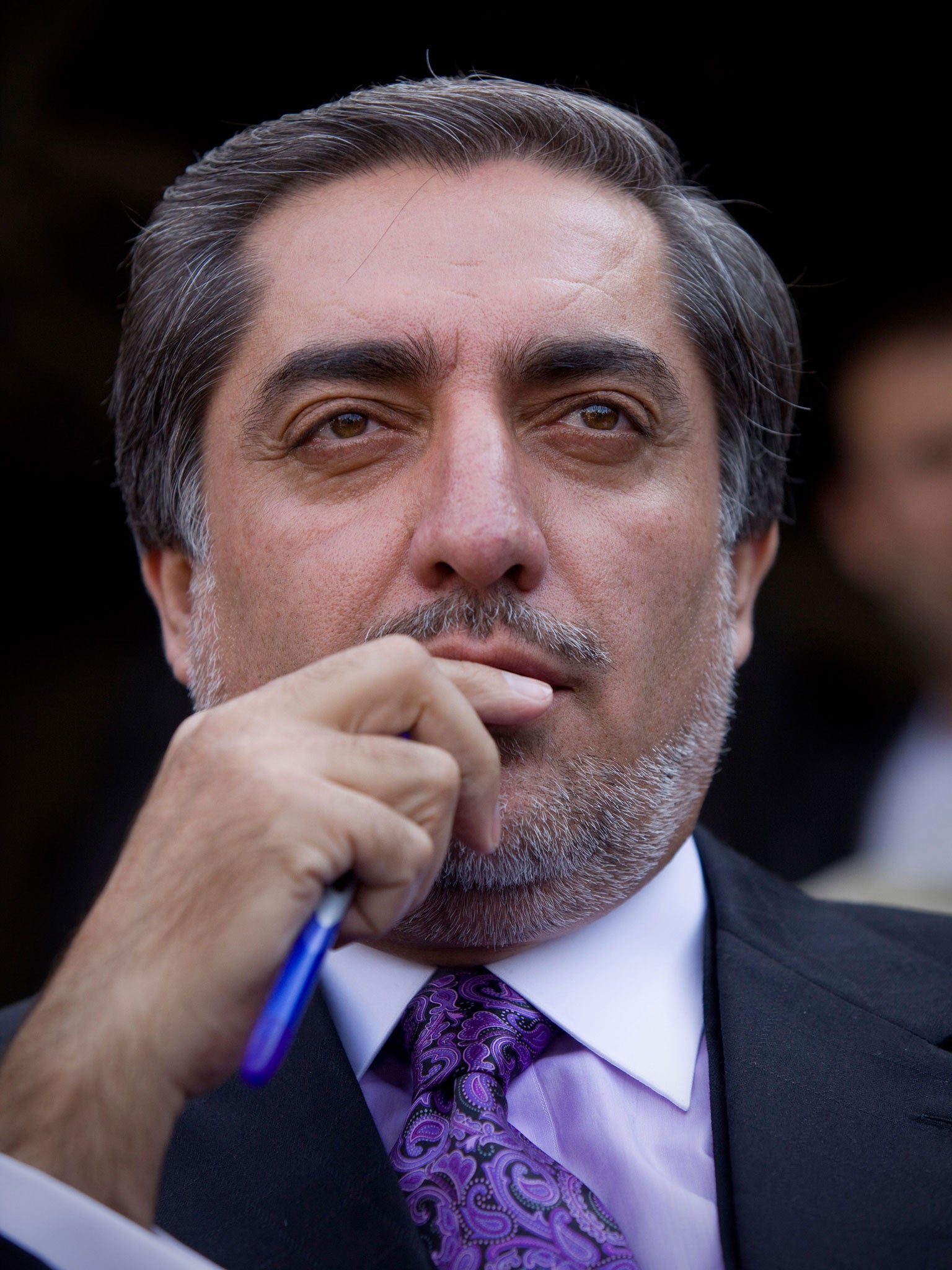Afghan poll results put Abdullah ahead as alleged fraud claims rise

Your support helps us to tell the story
From reproductive rights to climate change to Big Tech, The Independent is on the ground when the story is developing. Whether it's investigating the financials of Elon Musk's pro-Trump PAC or producing our latest documentary, 'The A Word', which shines a light on the American women fighting for reproductive rights, we know how important it is to parse out the facts from the messaging.
At such a critical moment in US history, we need reporters on the ground. Your donation allows us to keep sending journalists to speak to both sides of the story.
The Independent is trusted by Americans across the entire political spectrum. And unlike many other quality news outlets, we choose not to lock Americans out of our reporting and analysis with paywalls. We believe quality journalism should be available to everyone, paid for by those who can afford it.
Your support makes all the difference.The former opposition leader Abdullah Abdullah leads the race to become the next Afghan president after the first official election results, but recorded incidents of serious fraud exceed the figures for 2009 – the last time the presidency was contested – when more than a million suspect votes were discounted.
Initial results based on 10 per cent of the vote from 26 out of 34 provinces showed Dr Abdullah in the lead with 41.9 per cent, the Independent Election Commission said, while the Western-leaning academic Ashraf Ghani was in second place with 37.6 per cent.
A third candidate, running with the backing of two of President Hamid Karzai’s brothers, trailed far behind with 9.8 per cent.
The chairman of the election commission, Ahmad Yousuf Nuristani, said: “I want to make clear that the results could change in future, as we announce the results with additional percentages of the vote and this is not the final result.”
Afghanistan’s allies hailed the 5 April polling day as a success because of the high turnout, estimated at 60 per cent of 12 million eligible votes, and the failure of Taliban militants to stage high-profile attacks on the day.
But evidence of widespread fraud could undermine the legitimacy of an election meant to usher in Afghanistan’s first democratic transfer of power, as Mr Karzai prepares to step down after more than 12 years in power, and as Western forces prepare to leave.
The election complaints body hinted that it might need more time than expected to investigate all of the allegations, although the volume would not affect the overall schedule for electing a leader. Final results are expected on 14 May.
Nader Mohseni, a spokesman for the Independent Election Complaints Commission (IECC), said: “There is a possibility, in order to review the high number of complaints accurately, that we may expand the time frame for reviewing complaints in provinces for some days.”
The three front runners have all complained of fraud.
To win, a candidate must secure more than 50 per cent of valid ballots. Failing that, the top two candidates will go into a run-off.
Partial results from a sample of ballots had been expected on Saturday but they were delayed until yesterday afternoon.
The IECC has recorded a total 870 incidents of fraud classed as Priority A, complaints considered serious enough to affect the outcome of the election, which compares with 815 Priority A incidents recorded in 2009.
That said, the increased number recorded this year could reflect a greater willingness or capacity on the part of observers and voters to complain about fraud.
Video clips which are alleged to show polling station workers and other people stuffing ballot boxes are circulating on the internet, but it remains unclear whether they are genuine or who might have benefited.
In 2009, ballot-box stuffing was the most common type of fraud. The complaints commission has yet to disclose which type of suspected fraud has been most prevalent this time.
Overall, the IECC has recorded 3,724 complaints, exceeding the 3,072 in 2009. The number could rise as complaints reported in remote provinces reach Kabul.
Urban participation in the election was unexpectedly high, but it is unclear to what extent rural voters were deterred by the Taliban, who condemned the vote, and what role state officials, including police, had in encouraging people to back a particular candidate.
Reuters
Join our commenting forum
Join thought-provoking conversations, follow other Independent readers and see their replies
Comments